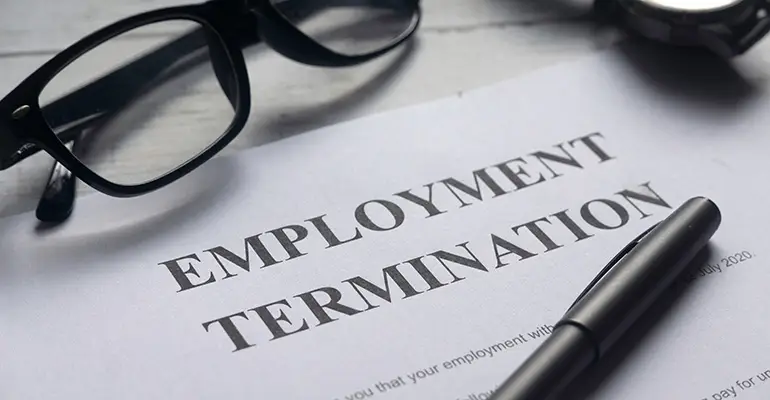At-will Employment and Wrongful Termination – Florida Employee Guide

- “Can you be fired for no reason in Florida?”
- “Is Florida an at-will employment state?”, or
- “Can you sue for being fired in an at-will state?”
If you’ve recently lost your job due to no fault of your own, it is important to understand your workplace rights and the difference between “at-will” employment and wrongful termination to better build your case.
At-Will Employment vs. Wrongful Termination in Florida: What’s the Difference?
At-will Employment
Florida is an “at-will” state. What this means is that absent contractual limitations to the contrary, an employer can fire an employee for any reason or no reason at all without advance notice as long as the termination is not for an unlawful reason. “At-will” employment in Florida also means that absent contractual limitations to the contrary, you can leave a job, and the employer cannot take legal action against you for doing so.
Additionally, “at-will” employment in Florida allows employers to demote you, cut your hours, change your job duties, or transfer you without cause — as long as the action does not violate employment laws. You may feel that a demotion or getting your hours cut at work is unfair, but that does not necessarily mean it is illegal. However, working in an “at-will” state does not give your employer the leeway to take any and all actions that they want at any time.
There are laws in place that offer comprehensive protection to employees. For example, if an employer violates federal or state laws when they fire you, you can sue them with the help of an employment law attorney.
Wrongful Termination
There are various actions by employers that may be considered “wrongful termination” which is often the term you may hear but really boils down to an “unlawful termination.” These include violations of the Title VII of the Civil Rights Act, such as Race Discrimination, Sex Discrimination, and Religious Discrimination.
Additionally, other employment laws protect workers from wrongful termination in Florida. For example, if you take time away from work to have a baby under the Family Medical Leave Act (FMLA), and your employer fires you, you may have a case. Whistleblowers have protections under Florida’s Private Whistleblower’s Act and Florida’s Public Whistleblower’s Act against wrongful termination as well. Additional laws that may apply to your case include the Age Discrimination in Employment Act (ADEA), Fair Labor Standards Act (FLSA), Pregnancy Discrimination Act, and the American Disabilities Act (ADA).
Did you file a workers’ compensation claim and then subsequently terminated from your job? You may have a case against your employer. Complaining about unpaid wages or overtime can also cause difficulty at work. Your employer may retaliate against you in several ways, including demotions, loss of benefits, changes in schedules, or even wrongfully terminate you.
Even though employees must contend with Florida “at-will” employment laws, multiple federal and state laws protect employees against wrongful termination.
Do You Believe You Have Been The Subject Of A Wrongful Dismissal In Florida? Take Action.
Employees have the right to sue their employer even with “at-will” employment in Florida. There are multiple things you can do when your employer violates your rights. Gathering any relevant documentation is an important part of building a case of wrongful termination.
Depending on your situation, documentation that can be helpful to your case includes:
- Employee handbooks and other employment policy documentation
- Paystubs, schedules, employee reviews
- Relevant emails, memos, or letters
- Text messages, videos, or other documentation relevant to your case
For example, if you believe you have been wrongfully terminated because you complained about sexual harassment, saving any documentation such as offensive emails, texts, or images sent to you can be important to your case.
Documenting the situation in as much detail as possible – whether you were fired due to complaining about sexual harassment, filing a workers’ compensation claim, complaining about unpaid overtime, or other situations – is a powerful action you can take toward getting justice.
Wrongful termination causes upheaval in careers, creates undue stress, and can affect families as well. If you feel your employer has violated your employee rights, consult with an employment law attorney to determine if you have a case.
Florida Employment Law Attorneys Fighting for Justice for Employees
Florida “at-will” laws do not allow employers to discriminate or take any other illegal actions against their employees. Know that you still have legal rights in the workplace with “at-will” employment in Florida.
Wenzel Fenton Cabassa, P.A. has helped thousands of employees across the state seek justice and hold employers accountable for illegal actions. We do everything in our power to help employees get the justice they deserve.
Please Note: At the time this article was written, the information contained within it was current based on the prevailing law at the time. Laws and precedents are subject to change, so this information may not be up to date. Always speak with a law firm regarding any legal situation to get the most current information available.
Related Posts
Recent Posts
- False Claims Act Retaliation & Your Rights
- Fired for Being Pregnant? 5 Situations When You Should Call an Employment Lawyer
- Can My Boss Take My Tips? The Laws of Tip Ownership
- What Does “Meets FCRA Requirements” Mean?
- Can Your Employer Contact You While on Medical Leave? Know Your FMLA Rights in Florida
Contact Us

FREE HELP GUIDES
Dealing with unpaid wages, discrimination or wrongful termination? Get the information you need to protect your workplace rights. We offer employment law resources to help you fight for workplace justice.


